How Much Will You Pay For Rent in New Zealand? Rent Prices 2024
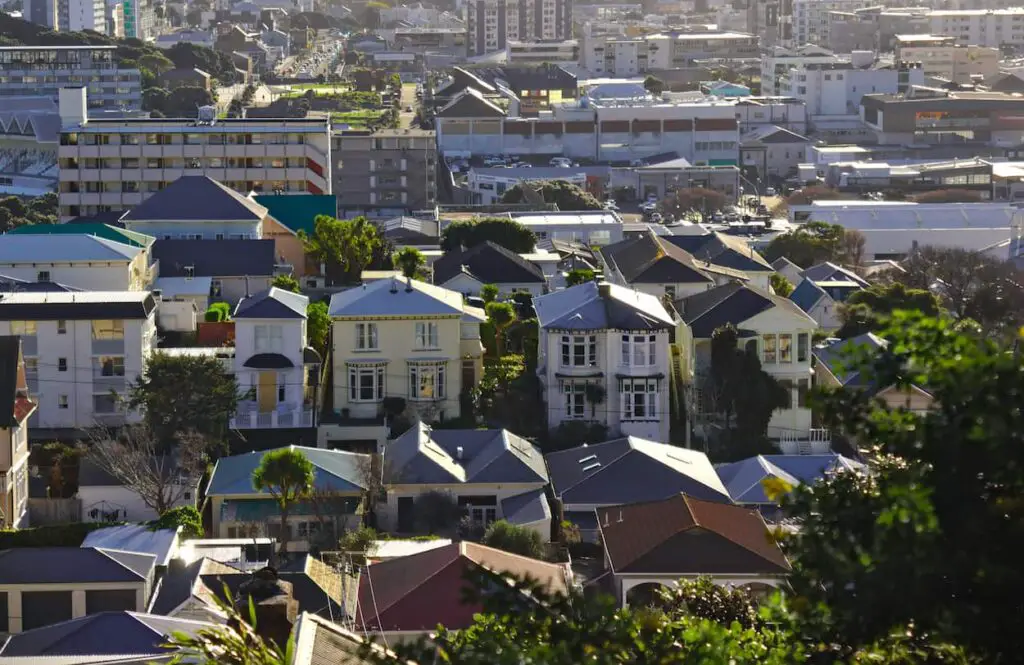
Rental prices are increasing across the world, and New Zealand isn’t an exception. That said, our rents are still lower than in neighboring Australia and significantly lower than in the US. In this article, we covered all the information you need on rent prices in New Zealand, various cities, regions, and household sizes for 2024.
The New Zealand national median rent in May 2023 is NZ$610 per week. It’s an all-time high number. In major cities, the rent for different house sizes varies and increases to NZ$695 per week. A studio can be rented for NZ$450, while a spacious three-bedroom home will cost around NZ$700-850 per week.
Curious about the average rent in different regions or how much New Zealanders spend on rent? Read on to uncover insights into median rent prices, statistical data, and the factors that influence how much you’ll pay.
Related: House prices in New Zealand (2023).
Average rent in New Zealand: what to expect?
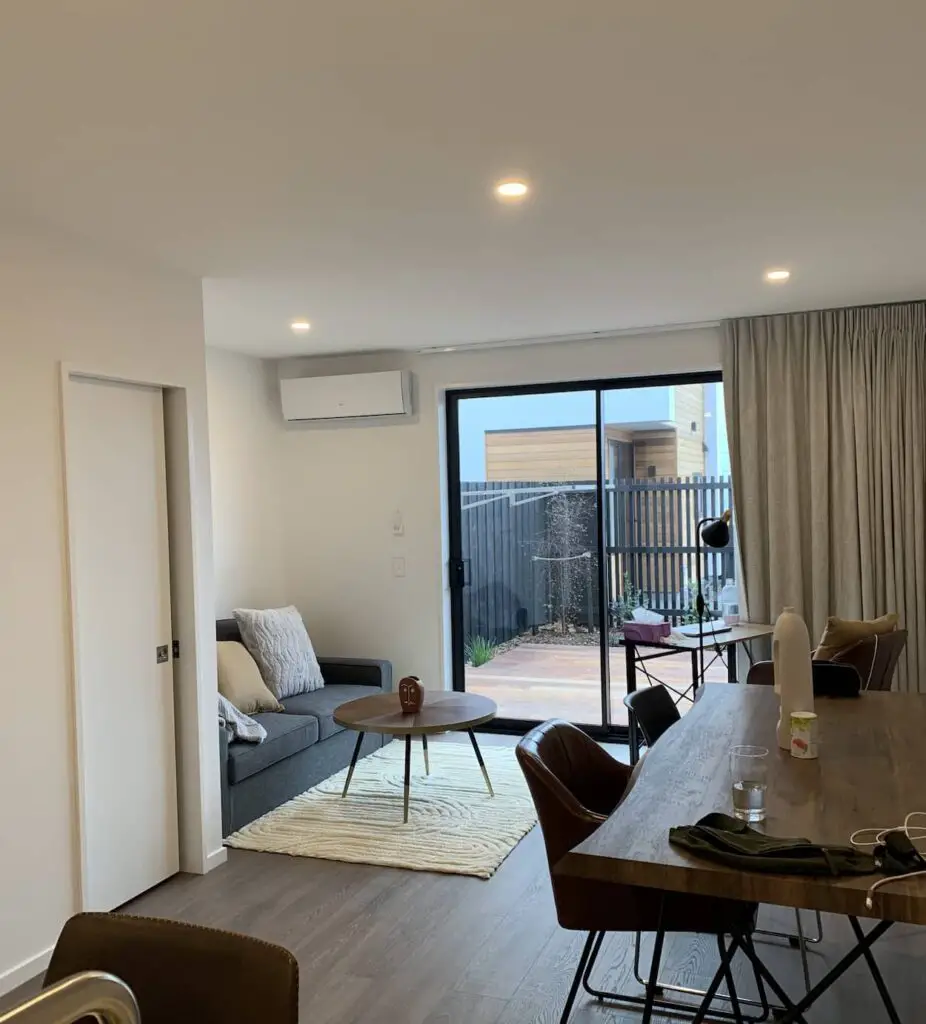
The national median rent in May 2023 was NZ$610 per week. In New Zealand, we always calculate rent per week.
According to TradeMe, the nationwide average rent for units is NZ$480, NZ$630 for townhouses, and NZ$550 for apartments, as of May 2023.
Rents for different housing types:
| Housing | Average weekly rent |
|---|---|
| Studio | NZ$400 – 530 |
| One-bedroom unit | NZ$450 – 550 |
| Two-bedroom unit or house | NZ$500- 600 |
| Three bedroom house | NZ$600- 800 |
Living in New Zealand brings to mind breathtaking landscapes, friendly locals, and a unique blend of cultures. But what’s equally important to consider is the place you’ll call home and the price tag that comes with it. With diverse options catering to different needs and budgets, the rental market in New Zealand offers something for everyone.
Starting with studios, these are perfect for a solo traveler or those who prefer compact living. The average studio rent in a major city will cost you around NZ$450 – 530 weekly. It’s a budget option that gives you some privacy and space at the same time.
For those looking for a little more room, a one-bedroom might be just the ticket. These can be available between NZ$495 to NZ$595 weekly. It’s a larger space that offers you room to breathe and live without feeling cramped.
If you’ve got a small family or plan to share with a flatmate, two-bedroom units in major cities average around NZ$525-650 weekly. This gives you the balance of communal living while maintaining your privacy. Three bedrooms are an even larger step up, offering space for a family or room for an office can be found for NZ$600-800 weekly.
TradeMe has reported record high rent prices in 2023 with the following numbers as of May 2023:
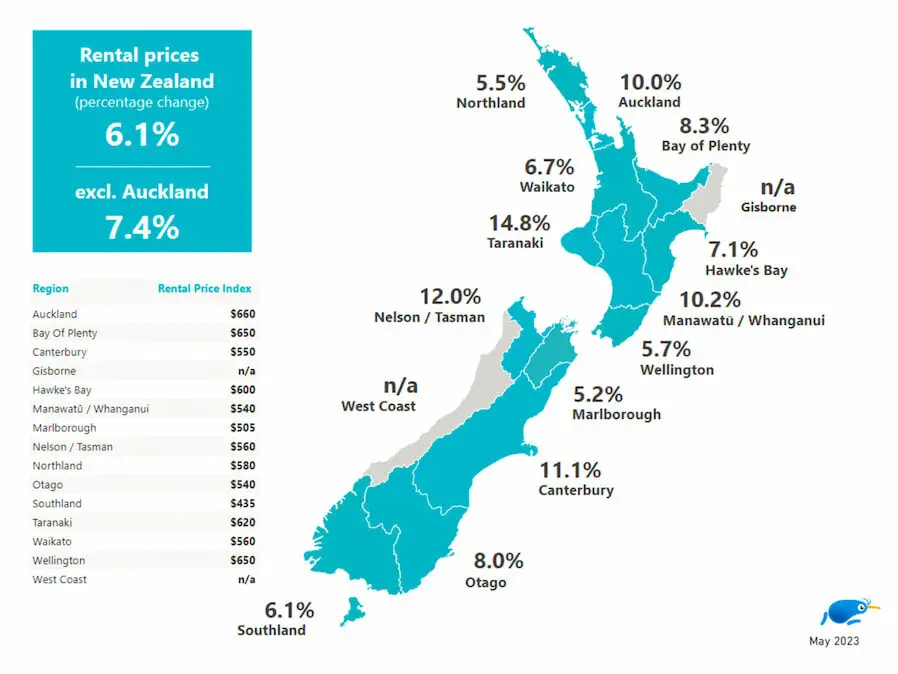
Here are the average rents according to Rental Price Index in May 2023:
| City | Apartment | Townhouse | Unit |
|---|---|---|---|
| Auckland | NZ$570 | NZ$700 | NZ$530 |
| Wellington | NZ$595 | NZ$650 | NZ$495 |
| Christchurch | NZ$495 | NZ$525 | NZ$450 |
Location plays a vital role in determining rent. Auckland, the city with the most opportunities, sets the pace with an average rent of NZ$600 – 650 weekly. Wellington, the nation’s capital, offers cultural richness, and the average rent is around NZ$580 – 620 weekly.
Christchurch, known as the Garden City, blooms with opportunities at an average rent of NZ$495 – 520 weekly. Students and those looking for historical charm might find Dunedin appealing at NZ$520 weekly, however, the Otago region itself is pretty expensive, with an average rent of NZ$620. See the regions for more details.
Regional median rent in 2023
According to Tenancy Services, here is the median weekly rent in all regions of New Zealand in January 2023:
- Wellington – NZ$620
- Otago – NZ$620
- Auckland – NZ$600
- Bay of Plenty – NZ$600
- Hawke’s Bay – NZ$550
- Northland – NZ$550
- Tasman – NZ$550
- Taranaki – NZ$530
- Marlborough – NZ$520
- Waikato – NZ$520
- Nelson – NZ$515
- Canterbury – NZ$500
- Gisborne – NZ$480
- Manawatū-Whanganui – NZ$460
- Southland – NZ$390
- West Coast – NZ$380
Find out which places have the cheapest rent in New Zealand.
But what does this mean in terms of the country’s overall picture? The statistical data shows a range of rents across regions and main cities. These numbers, although varying, represent the demand and supply dynamics of different areas. With city living often attracting higher rent prices, smaller towns and rural areas offer more affordable options.
A crucial aspect to consider is how much of your income goes into rent. As of January 2023, the average New Zealander spends about 25% of their income on rent. While this might seem steep, it reflects the value placed on housing and location preferences.
So there you have it, a comprehensive look at what to expect when renting in New Zealand. From solo studios to family-friendly three-bedrooms, from city vibes to serene rural living, the choice is yours.
Rent prices in Auckland
Ah, Auckland! It is the largest city in New Zealand, where the cosmopolitan meets the coast. If you’re planning to live in this thriving city, it’s essential to know the lay of the land in terms of rent. So, let’s dive in!
Starting with the basics, studios in Auckland’s central business district could set you back an average of NZ$495 – NZ$520 weekly. Ideal for young professionals or students, these units offer easy access to all that the city has to offer.
Now, if you require more space, one-bedroom apartments range around NZ$570 weekly. Whether you’re a young couple or simply appreciate more room, this could be your perfect fit. It is important to remember that rents in Auckland vary by suburb.
For those looking to share or have a growing family, two-bedroom homes average NZ$700 per week, while three-bedroom properties may hover around NZ$750 – 800.
But Auckland is a city of diversity, and its popular suburbs reflect this beautifully. Ponsonby, known for its hipster vibe, could be a tad pricier but offers an engaging cultural scene. Rents in Ponsonby might range from NZ$530 for a studio to NZ$800 for a three-bedroom house. Mount Eden balances accessibility and suburban charm.
North Shore’s beachy serenity appeals to many. In contrast, the North Shore offers a broad range from NZ$500 for a studio to NZ$700 for three bedrooms.
Suburbs in South Auckland, like Manukau, offer affordability and robust local communities. Manukau’s range typically falls between NZ$450 for a studio and NZ$600 for a three-bedroom property.
What’s the picture like statistically? Auckland’s median rent reflects the desirability of its location and lifestyle, averaging around NZ$695 weekly as of 2023. This figure has been increasing steadily over the years.
But here’s a local tip: Not all suburbs are created equal. Auckland’s vast sprawl offers hidden gems and not-so-shiny spots. Before you settle, take some time to understand the good and bad suburbs of Auckland to make an informed choice.
Auckland’s rental market is as diverse as its people and places. Whether you’re drawn to the city’s heartbeat or the peaceful whispers of the shore, there are varying price points. Keep these figures and tips handy when you embark on the exciting journey of exploration to find your Auckland home.
Rent prices in Wellington
Nestled at the southern tip of New Zealand’s North Island, Wellington offers a unique blend of political, cultural, and natural attractions. If you’re considering calling Wellington home, here’s what you’ll want to know about rent prices.
Studios to three-bedrooms: What’s the cost?
- Starting small, studio apartments in Wellington are perfect for the solo dweller seeking city excitement, averaging around NZ$495 weekly.
- Need a bit more space? One-bedroom apartments provide comfort without breaking the bank at about NZ$595 weekly.
- Two-bedroom homes suitable for sharing or a small family, average around NZ$650 weekly.
- Three-bedroom homes offer more space for roughly NZ$700+ weekly.
These prices reflect the general trend, but rent in different suburbs of Wellington will certainly vary. See the exact numbers on Tenancy.govt.nz.
Rents in popular suburbs of Wellington
The best suburbs of Wellington are as varied as its landscapes. Take Te Aro rents as an example because urban living thrives there. Rents can range from NZ$490 for a studio to NZ$750 for a three-bedroom house. Newtown is a melting pot of cultures and offers a similar range.
Porirua and Upper Hutt are the most expensive areas to live in Wellington, with a median weekly rent of NZ$650. Suburbs like Lower Hutt provide more affordable options, from NZ$450 for a studio to NZ$650 for a three-bedroom house.
Karori is a family-friendly suburb with beautiful parks and excellent schools. Mount Victoria offers breathtaking views and a great sense of community. Depending on the suburb, you may find a wide range of rental prices to suit various budgets and lifestyles.
Statistics provide a broader picture of Wellington’s rental market. As of 2023, Wellington’s mean weekly housing rent sits at around NZ$670. The median rent offers another perspective, showing what most renters may encounter.
It’s worth noting that Wellington’s rents have seen fluctuations over the years, affected by factors such as housing demand, economic conditions, and changes in the local population. It’s always wise to consult current data and perhaps even local real estate experts to gauge the latest trends.
Finding your place in Wellington
Whether you’re a political aficionado, art lover, outdoor enthusiast, or all of the above – Wellington has a place for you. From the bustling city center to the tranquil suburbs, each area offers its unique character and charm.
Seek the trendy vibes of Cuba Street, enjoy the beach life in Oriental Bay, or find solace among the hills of Wadestown. Wellington’s rental market, with its varying price points and styles, invites you to explore and find the perfect fit for your lifestyle.
Why renting in New Zealand is so expensive?
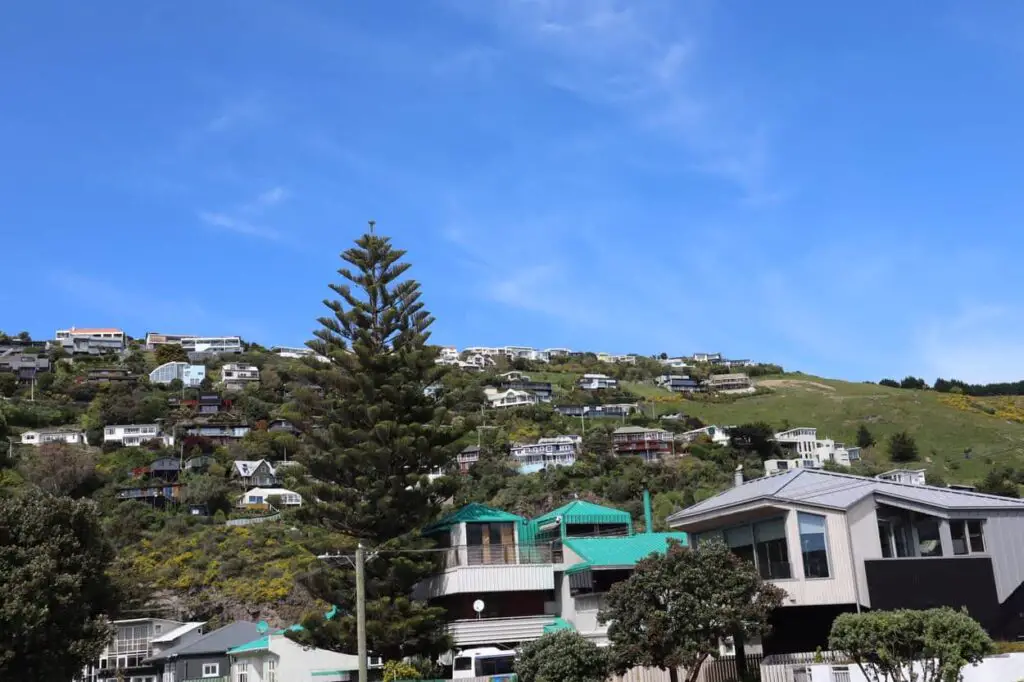
Renting in New Zealand is an exciting proposition till you find your forever home. However, in recent years, the rental market has become increasingly expensive. In 2023, New Zealand has experienced the highest rents ever.
A variety of factors are contributing to this trend, making renting a more costly affair for both locals and newcomers. Let’s delve into some key reasons behind the high rent prices.
1. Housing shortage
A significant housing shortage is one of the most apparent reasons for the high rent in New Zealand. The demand for housing has been growing at a much faster rate than supply, particularly in major cities like Auckland, Wellington, and Christchurch.
When you visit an apartment or a house in New Zealand, you often will encounter many other interested parties. Also, when you apply for a place you like, you won’t be a solo applicant. You will have to compete with other people.
The gap between the number of available properties and the number of people looking for housing has led to a natural increase in prices. This imbalance has increased further by factors like population growth, urbanisation, and increased immigration.
2. Land scarcity
Land scarcity, especially in prime locations, adds to the cost of housing in New Zealand.
Major cities are constrained by geographical limitations, such as mountains and coastlines, leading to a shortage of buildable land. This scarcity has driven up the price of land and, consequently, the rent prices.
For instance, Auckland is limited on its two sides by sea, so it can only grow to the North or to the South. This creates constraints for new builds projects and, therefore, housing availability.
3. Inflation and economic factors
The current inflation rate in New Zealand is 6%. That means our money loses at least 6% in value or prices are higher by at least 6%. Inflation and other economic factors have also played a role in driving up rent prices. The cost of building materials and labour has risen, leading to higher construction costs.
These increased costs are often passed on to tenants in the form of higher rents. Additionally, the economic growth in certain areas attracts more people, leading to higher demand and higher rents.
4. Government regulations and taxes
Regulations around building and land use can restrict the availability of housing and add to the cost of construction. Property taxes and other levies can add to the cost, all of which can contribute to higher rent prices.
Zoning laws, building codes, and consent processes might be necessary for environmental and safety reasons, but they can also make housing development more complex and costly.
5. Lifestyle preferences and amenities
The desire for certain amenities and lifestyle preferences also contributes to rental costs. People are willing to pay more for properties in locations with good schools, healthcare, transportation, and recreational facilities. Moreover, rentals in areas offering outdoor activities and views always cost at a premium.
If an area develops a reputation for being secure, vibrant, and accessible, more and more people start moving there. This demand drives up the prices in these preferred areas.
6. Global trends and foreign investment
International trends and foreign investment in New Zealand’s property market have also played a role. Foreign investors seeking stable returns have turned to New Zealand’s real estate, pushing prices. Though regulations have been implemented to control this, the impact is still felt in the rental market.
7. Natural disasters and insurance costs
New Zealand’s susceptibility to natural disasters like earthquakes and floods has led to increased insurance costs for property owners. These costs are often passed on to tenants, adding to the overall rent.

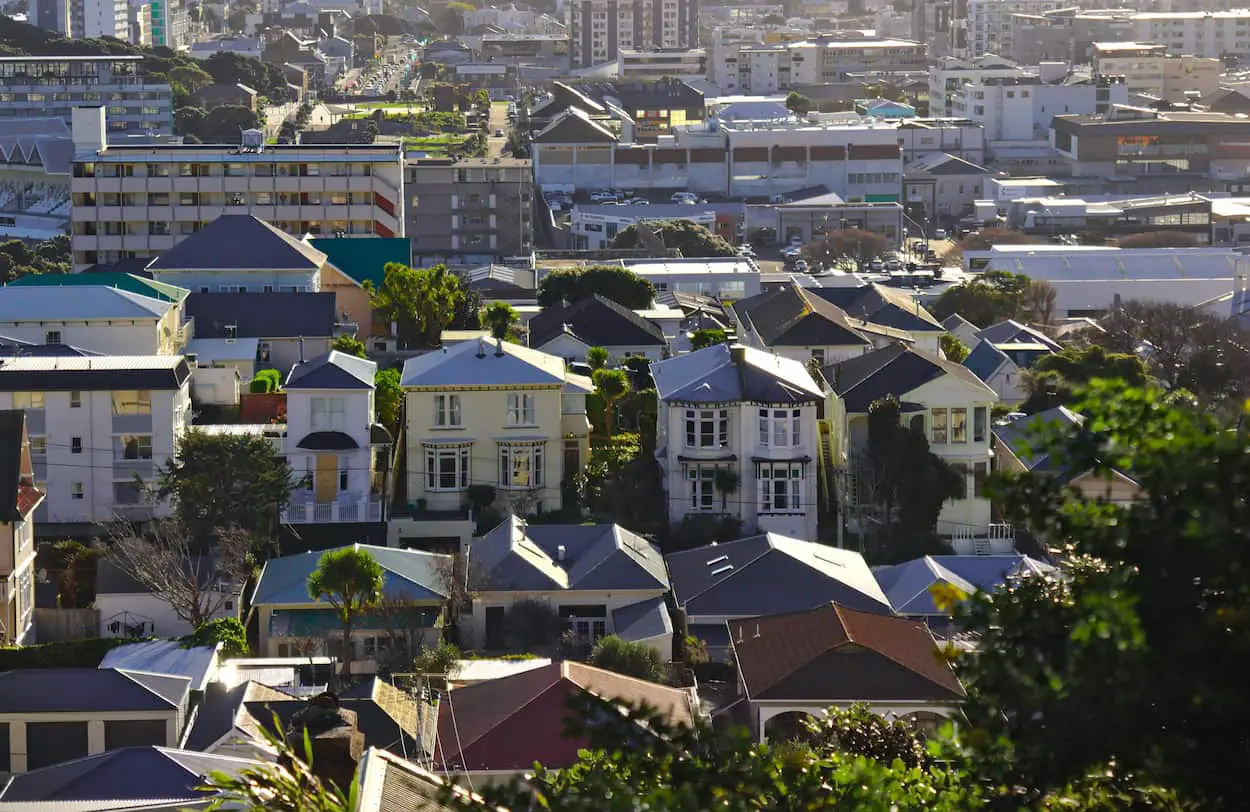
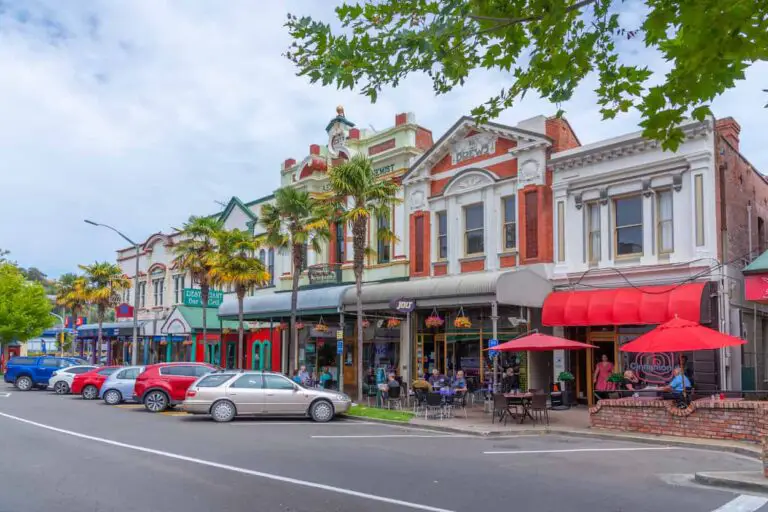
![Easiest Bank To Get A Home Loan in New Zealand [2024]](https://simplenewzealand.com/wp-content/uploads/2023/07/IMG_3646-min-1-1-768x576.jpg)
![Cost of Living for An Average Family in New Zealand [2024 Guide]](https://simplenewzealand.com/wp-content/uploads/2023/01/Depositphotos_48225999_L-768x512.jpg)
![Cost of Food in New Zealand: How Much To Budget? [2024]](https://simplenewzealand.com/wp-content/uploads/2023/01/Depositphotos_363854088_L-768x512.jpg)
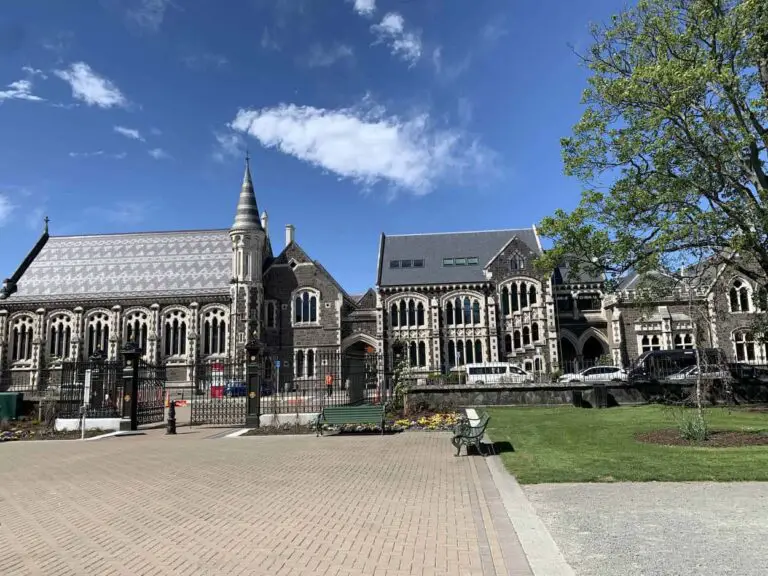
![Guide To Buying Land in New Zealand [2024]](https://simplenewzealand.com/wp-content/uploads/2023/04/IMG_2664-1-768x576.jpg)